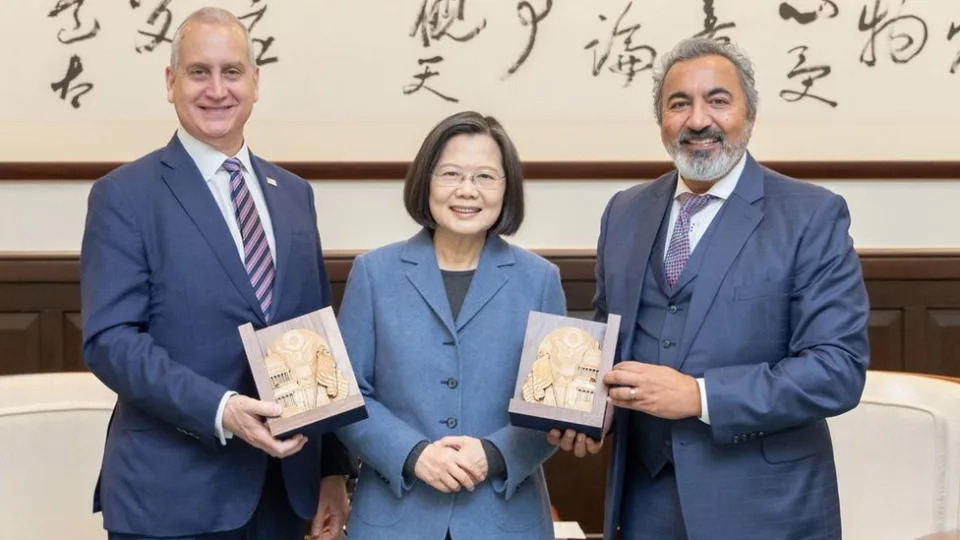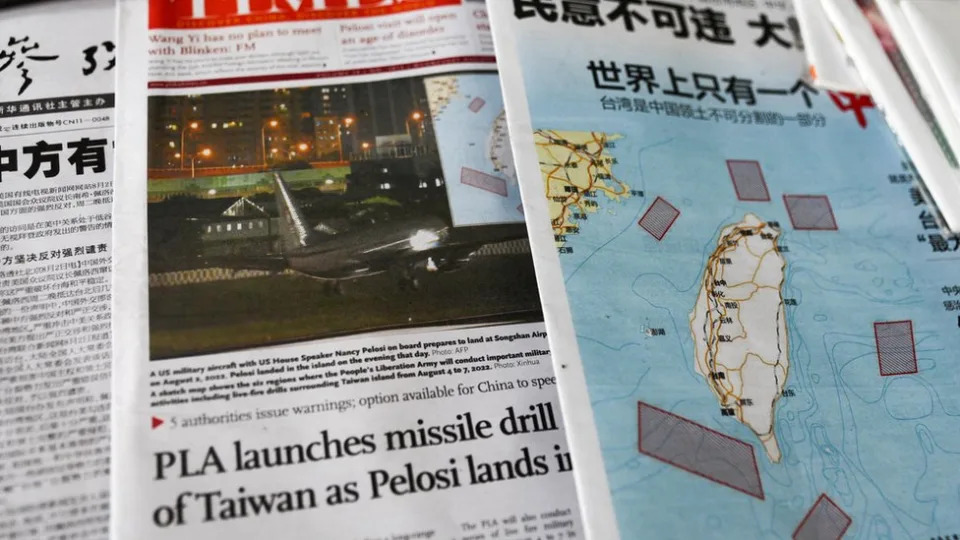"How would you like it if we started sending official delegations to Honolulu to meet with separatist leaders who want Hawaiian independence from the United States? What would you do if we started selling them weapons?"
It might seem like a false equivalence, but this is a line of argument often deployed by China's legion of armchair warriors, who take to social media to condemn any visit to Taiwan by US government officials - and especially members of the US Congress. China sees self-ruled Taiwan as a breakaway province that will eventually be under Beijing's control, and so, to these social media users, such visits are an unacceptable provocation and interference in China's internal affairs.
Of course, these visits - like the one being made by Representative Mike Gallagher, head of the US House's China committee, this week - are viewed very differently in Washington and Taipei, which sees itself as distinct from the Chinese mainland, with its own constitution and democratically-elected leaders.
But it does raise the question, what is their purpose? Are they a genuine show of support that helps deter China - or are they publicity stunts that serve to provoke Beijing, and solidify the view that Washington is intent on the permanent separation of Taiwan?
The visits are not without consequence. How the US handles its relationships with Beijing and Taipei will do much to determine whether the current tense stalemate across the Taiwan Straits remains that way, or gets a lot worse.
"We have come here to reaffirm US support for Taiwan and express solidarity in our shared commitment to democratic values," said Congressman Ami Bera and Mario Díaz Balart as they wound up a trip here in January. They were the first to make the pilgrimage to Taipei following the 13 January presidential election.
Now, the hawkish Rep Gallagher - who told the Guardian last year Beijing was aiming "to render us subordinate, humiliated and irrelevant on the world stage" - arrives with a number of colleagues a month later. It is likely they will not be the last. Since 2016, the number of US congressional delegations crossing the Pacific has increased dramatically. In 2018, for example, six lawmakers made the trip. Last year, 32 visited, according to a tally by Global Taiwan.

That trend has been actively encouraged by Taiwan's current President Tsai Ing-wen, and does not appear to have been discouraged on the US side. Indeed, President Joe Biden has been the most explicit of any US leader yet in his defence of Taiwan - albeit while still continuing a commitment to America's One China policy.
"It's important," says J Michael Cole, a former Canadian intelligence officer and one-time advisor to President Tsai. "The United States keeps saying we have a rock-solid commitment to Taiwan. But you need a public component to that exercise. That's what rattles Beijing, that's what gets journalists writing about it."
And unlike the $80m (£63m) grant signed off by Biden in November, these visits also represent a low-cost way for the US to re-assure the people of Taiwan that they do mean what they say.
"We have research that shows high-level visits increase people's confidence in the US-Taiwan relationship," says Chen Fang-yu, a political scientist at Soochow University in Taipei.
Such visits promote a more friendly attitude towards America from those who remain sceptical of whether the US would actually turn up if Taiwan were attacked by China, he explains. However, there are others here who have imbibed conspiracy theories, many of which originate from across the Taiwan Strait, that America is pushing Taipei down the road to war with China, just as conspiracy theorists say it did with Ukraine's war with Russia.
Meanwhile, American congressmen and women have their own, not always selfless, reasons for coming here. The pilgrimage to Taipei is increasingly a way for those on the right to burnish their anti-China credentials to voters back home - although these days, the left appears just as keen to prove their own tough stances when it comes to Beijing.
The increased frequency, and unabashed publicity, shows how much has changed between Washington and Beijing.
"Before 2016, people thought visits here should be low key," says Chen Fang-Yu. "They wanted to avoid angering China. But now more and more people realise that no matter what they do, they will anger China."
Taiwan's relationship with the US Congress is deep and long. When in 1979, President Jimmy Carter broke relations with Taipei, and recognised Beijing, it was the US Congress that forced him to sign the Taiwan Relations Act. That act is what underpins the relationship with Taipei to this day. It explicitly commits the US to opposing any attempt to change the status quo across the Taiwan Strait by force, and to supplying Taiwan with sufficient weaponry to defend itself against China.
In the 1970s, Taiwan was a military dictatorship. Its US allies were Republican. The cold war was still very chilly, and the islands were seen as a bulwark against Communism. Today, anti-communism may still play a small part. But far more important is solidarity with a fellow democracy. Taiwan is no longer a Republican Party cause. In the wake of things like Trump's trade wars, arguments over Covid's origins and spy balloons being spotted in the US, support for Taiwan among Americans now spreads through both parties.
Added to this, the US also has major national security and economic interests tied to Taiwan - in particular, the semiconductor trade.
It all means that, unlike with Ukraine, there a no voices in Congress calling for the US to cut military support for Taiwan. If anything, it is the opposite.

But that question remains. Do the visits do more harm than good? When Nancy Pelosi came here in the summer of 2022, Beijing responded by firing ballistic missiles over the top of the island for the first time, including over the capital Taipei. Opinion polls taken after the visit showed a majority here thought the visit had damaged Taiwan's security.
It is quite common these days to hear those who specialise in Taiwan studies quoting the old maxim from President Theodore Roosevelt to "speak softly and carry a big stick". J Michael Cole says that is exactly what the US and Taiwan are doing. He says the US congressional visits might be symbolic, but they are good PR for Taipei and for the members of Congress. With the exception of the Pelosi visit, they also fall below the threshold of what really upsets Beijing.
But, says J Michael Cole, what do these visits really mean for US-Taiwan relations? After all, "the really substantive aspect … such as the increasingly high-level exchanges on things like intelligence, like defence, those don't make the news".
"Those are constructive," he continues. "And the United States is adamant that those shall not be publicised by Taiwanese government."
US will support Taiwan regardless of election results, Rep. Gallagher says on visit to island
American support for Taiwan will continue no matter who wins the upcoming US election, House Rep. Mike Gallagher told an audience in the democratic island on Thursday, as tensions simmer between Taipei and Beijing.
“I’m confident regardless of how the presidential election goes, we will maintain our support not only for Taiwan but also a posture of internationalism and engagement,” Gallagher told reporters in the capital Taipei.
The lawmaker, who chairs the House of Representatives select committee on China, is leading a five-member bipartisan delegation on a three-day visit to self-ruled Taiwan.
The trip comes amid a period of heightened tensions between Taipei and Beijing, following the deaths last week of two Chinese fisherman Taiwan said trespassed into protected waters.
China’s ruling Communist Party claims Taiwan as its own territory, despite never having controlled it, and has vowed to take the island – by force if necessary.
Gallagher said American efforts to support Ukraine’s defense against Russia’s invasion were also critical to deterring Beijing from using force against Taiwan.
“The outcome in Ukraine matters not only for Ukraine and American credibility, but for deterrence in the Indo-Pacific, for cross-strait deterrence,” the lawmaker said.
US funding for Ukraine has been mired in political infighting in Congress, where a contingent of Republicans are resisting additional aid, encouraged by presidential candidate Donald Trump.
Trump is widely expected to face off against incumbent Joe Biden in the presidential elections in November.
The potential return to office of the former president, who earlier this month said he would not defend NATO allies that failed to spend enough on defense, has raised concerns in Europe about continued US support for Ukraine.
Speaking alongside Gallagher in Taipei, Raja Krishnamoorthi, a Democratic congressman, also told reporters in the same news conference that Washington “can’t be tough on China and weak in your support of Ukraine … you can’t be inconsistent.”
Beijing’s ire
The US delegation also met with Taiwan’s President Tsai Ing-wen and President-elect Lai Ching-te on Thursday.
Gallagher lauded Tsai, who ends her final term in office in May, as an “incredible” and distinguished leader of the free world where “freedom is under attack from authoritarian aggression.”
Tsai said Thursday that Taipei hopes “to see even more Taiwan-US exchanges” this year.
Congress plays an important role in the unofficial relations between Taiwan and the United States, which ended formal diplomatic ties with the self-ruled island in 1979 when it recognized Beijing.
American lawmakers regularly visit Taiwan and have supported legislation to bolster US support for the island and its defensive capabilities.
Gallagher, a Republican representing Wisconsin, has been a staunch supporter of Taiwan and a strong critic of China during his tenure in Congress.
The delegation’s visit sparked the ire of Beijing, with the Chinese Foreign Ministry on Thursday saying it “always firmly opposes any form of official exchange between the United States and the Taiwan authorities and firmly opposes any interference in Taiwan affairs by any means or under any pretext.”
Troubled waters
The delegation’s visit comes during a period of heightened tensions between China and Taiwan, sparked by the drowning of two Chinese fishermen near Taiwan’s Kinmen Island last week.
According to Taiwanese authorities, the fishermen died after their speedboat capsized following a high-speed pursuit by Taiwan’s coast guard, which accused the vessel of entering prohibited waters.
Following the incident, Taiwanese authorities last week expressed regret over the deaths, but maintained that its maritime law enforcement officers were acting on their mandates in accordance with the law.
China condemned the incident and has since ramped up patrols in the area, including a rare Chinese coast guard interception earlier this week of a Taiwanese tourist boat.
The situation escalated further Wednesday when China accused Taiwan of a cover-up over the deaths after state media reported the return of two surviving Chinese crew members.
In an interview with Chinese state broadcaster CCTV on Tuesday, one of the surviving fishermen said their boat was struck by a Taiwanese coast guard vessel.
“We didn’t expect it to rush over and hit our boat,” he said in a video. “How could our boat capsize on its own? … (They) rammed into us and knocked us over.”
China’s Taiwan Affairs Office issued a statement accusing Taiwan authorities of “seeking to evade responsibilities and covering up the truth.”
“We solemnly demand relevant parties in Taiwan to release the truth as soon as possible, severely punish those responsible … and solemnly apologize to the families of the victims,” Zhu Fenglian, a spokesperson for the office, said in the statement.
Taiwan had earlier denied Beijing’s accusations of “rough expulsions” and defended the actions of its coast guard, saying the incident happened due to the refusal to cooperate by the Chinese fishermen, who made a dangerous move to flee.
On Thursday, deputy captain of Taiwan’s coast guard Chen Chien-wen said the Chinese vessel took a “sharp turn” while evading the coast guard, causing the speedboat to crash into the Taiwanese vessel and capsize.
Taiwan’s coast guard also said on Thursday that it cannot comment on China’s calls to “severely punish” personnel responsible for the deaths of the fishermen as the case is under investigation.
China demands the US stop any official contact with Taiwan following a congressional visit
China responded sternly Thursday to a U.S. congressional delegation’s visit to Taiwan, demanding the U.S. stop any official contact with the self-governing island.
“China opposes any form of official interaction between the U.S. and Taiwan authorities and rejects U.S. interference in Taiwan affairs in whatever form or under whatever pretext," Foreign Ministry spokeswoman Mao Ning said. She urged Washington to be “mindful of the extreme complexity and sensitivity” of the Taiwan issue.
Mao spoke shortly after leaders of the House Select Committee on China’s Communist Party met with Taiwanese leaders on a high-profile trip aimed at showing U.S. support for the island’s democratically elected government.
The congressional visit drew a stronger-than-usual response. Beijing has long protested any official interaction the U.S. and Taiwan but is particularly dissatisfied with the House select committee, which was formed in 2023 and is known for its hawkish views of China's ruling party.
However, the visit is unlikely to trigger major military actions as then-House Speaker Nancy Pelosi's visit did in the summer of 2022. Beijing and Washington are seeking to stabilize their rocky relations following a November meeting between U.S. President Joe Biden and Chinese President Xi Jinping.
The congressional visit coincided with an announcement by the U.S. State Department of a $75 million arms sale to Taiwan. The sale is relatively minor in size and does not include weaponry. Instead, it covers communications and global positioning systems as well as related technology.
Mao criticized the sale as “undermining China’s sovereignty and security interests and harming China-U.S. relations and peace and stability across the Taiwan Strait.”
The U.S. is obligated under a 1979 law to provide Taiwan with sufficient military hardware and technology to deter invasion, and its arm sales to Taiwan have always drawn strong opposition from Beijing, which considers the island as part of Chinese territory and vows to take it, by force if necessary.
Taiwan is also part of the $95 billion aid package that passed the Senate this month but has stalled in the House. That package, which focused on Ukraine and Israel, included $1.9 billion to replenish U.S. weapons provided to Taiwan. An additional $3.3 billion would go to build more U.S.-made submarines in support of a security partnership with Australia and the United Kingdom.
In Taiwan, Rep. Mike Gallagher, the select committee's Republican chair, and Rep. Raja Krishnamoorthi, its Democratic ranking member, suggested ways to speed up the delivery of military weapons to Taiwan, including joint production of some weapons that do not need intellectual property transfer, according to a report by Central News Agency, the island’s main wire service.
The delegation met with Taiwanese President Tsai Ing-wen and also President-elect Lai Ching-te. Lai, who won a three-way race in January and will take office in May.
“Today, we've come as Democrats and Republicans to show our bipartisan support for this partnership, which, thanks to your leadership, I think is stronger and more rock solid than ever,” Gallagher said during the meeting with Tsai.



